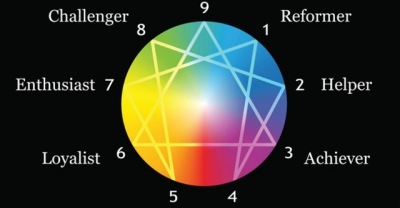What exactly is the Enneagram? A counselor’s take

Several weeks ago I was in a coffee shop near Boston, and unlike many of the patrons, I actually had come simply to buy coffee. If you have noticed, the coffee shop in our time has become an especially popular place for young people to congregate and talk about ideas in a way not unlike how I would imagine the marketplace Athenians in Acts 17:21. If you have either been around younger people of this sort or perused some of the more popular youth-oriented magazines and newspapers, I do not doubt that you will have heard of the Enneagram. While I was getting my coffee that day, I overheard a certain conversation where a young man attributed some of his behaviors and circumstances to the fact that he is “a two” on the Enneagram. Because the Enneagram is related to psychology and I work in mental health, I hear this sort of language often. Even so, it has found its way out of the personality psychology world and into just about every other area of life, including the life of the church. At the time of this writing I simply searched “Enneagram” on the website of a popular Christian publication and over 30 articles were written about it directly or indirectly about it in the last two years. We are all very interested in the Enneagram. But before we decide whether that is good or bad, or whether we should even care, we have to answer a more important question: What is it?
First, do not be concerned that the Enneagram symbol bears a slight resemblance to the satanic pentagram; there is nothing to say that is more than a coincidence. As a disclaimer, I do not believe the Enneagram is overtly evil or satanic, although there are some who do believe that. Most commonly, the Enneagram is seen as a way of understanding human personality. The Enneagram is a way of understanding human personality. It classifies people into nine categories, represented by numbers (hence the name, as “ennea” is Greek for nine). These are the Reformer (1), the Helper (2), the Achiever (3), the Individualist (4), the Investigator (5), the Loyalist (6), the Enthusiast (7), the Challenger (8), and the Peacemaker (9). It relies upon the premise that every person has a dominant type, and that to a large extent this type is ingrained and unchanging from the beginning of one’s life and involves behaviors, attitudes, motives, and the like. These nine categories are further divided into three “centers” (instinctive, thinking, or feeling) which have a dominant emotional theme (anger, fear, or shame, respectively). The idea behind this is that each type develops forms of responding to these dominant emotions which mark their unique type. Each type manifests particular virtues, vices and ambitions. Even though each person is said to have one type, Enneagram psychology argues that each person has an adjacent type (or two, depending on who you ask) which is referred to as a “wing”, or a sort of sub-type. There is a whole psychological system to this which spans volumes, and to spare you the complexity, that may suffice as an overview.
It may be important to note that the origin of the Enneagram is unclear and indeed a matter of debate. Some have made valiant efforts to baptize the more mystical elements of Enneagram philosophy into more Christian language, but the jury is out on whether or not that has been a successful or even a necessary effort. There are elements of the Enneagram that sound more at home with eastern religion and others that seem quite compatible with the Christian worldview. It is true that some of the most passionate devotees of the Enneagram are involved with New Age spirituality, so hesitancy in engaging with the philosophy that comes with the psychological system is surely warranted. However, this need not entail that using the Enneagram is the equivalent of participating in occultic spirituality. Therein lies the need for wisdom and discernment which begins with simply understanding what it is.
I do believe that there are helpful elements to the Enneagram as there are with many other ways of understanding personality (like the Myers-Briggs, which is a more traditional type-based personality test). However, the problem with some of these instruments is that they can lead people to embrace a form of deterministic thinking about identity and personality that can be a hindrance. For example, someone could determine that they are an “eight” on the Enneagram and therefore that justifies some negative behavior. Exactly how much one’s personality is malleable or can change is a perennial question for which there are few good answers. When it comes to deterministic thinking about personality though, I have concerns. If people cannot change or do differently, then my job as a counselor is pointless and indeed it is unfair for anyone including God to ever ask us to do differently. I am sure some elements of my personality are fixed, but the moment I start assuming that something like my Enneagram is the true, fundamental reason why I do something and that is just the way it is, then I have failed to really understand what the Enneagram is and what it should be.
As a counselor I have noticed that the use of these sorts of personality-based tools can aid in people’s self-understanding or they can stifle people and put them into a box. It may not be necessary to avoid personality-based systems like the Enneagram, but we should be aware of what they are, and be informed and cautious in how much stock we put in them. They can be useful, but they are useful only to a certain degree. They are not meant to function as an infallible guide for understanding your identity. Whether it is the Myers-Briggs or the Enneagram, for many these are tools which can help with self-awareness, and that is good. But if a something like the Enneagram stresses you more than it helps you, toss it. It is one of many tools.
I would hope that such tools can lead us to a greater understanding of the glorious ways in which God made and gifted all of us. But again, if the Enneagram leads you in any other direction, then don’t bother with it. There is so much about psychology and science that we as believers can and should embrace, but we must hold the right things in tension. Indeed we believe that these are fallible and limited things which can be of aid in understanding ourselves. That is simply all that the Enneagram is, and all that it should remain.
William Bowes is a Mental Health Counselor in Boston, Massachusetts and a graduate of Gordon Conwell Theological Seminary.





















